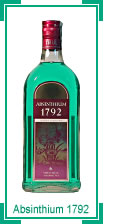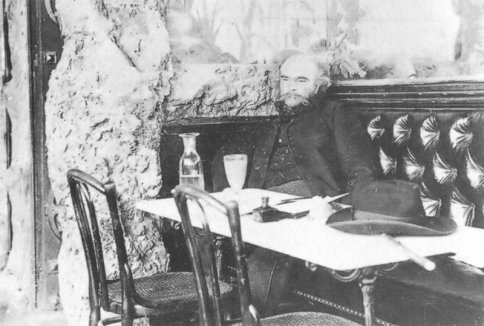A very strange film showing two well known folks apparently off their rockers after drinking Czech absinth in a Prague bar. It is titled “Happy Hour Absinthe in Prague”
What I’m drinking…
Whenever I can get hold of it, I drink the ever so...

Hard to get and pricey, but definitely worth it. Not only does Century contain a massive amount of the all-important thujone, it is also one of the best-tasting absinthes I have ever had - a rare combination!
My rating:
On the web: centuaryabsinthe.com

 I really like this one! Much more affordable than Century, my all-time favourite, but still very, very good. Maktub is the party spirit from the jazz age with a clean, fresh taste and plenty of buzz. Recommended.
I really like this one! Much more affordable than Century, my all-time favourite, but still very, very good. Maktub is the party spirit from the jazz age with a clean, fresh taste and plenty of buzz. Recommended.
My rating:
On the web: absinthe.in

 Perhaps the only fault of Doubs Mystique is its relatively low thujone content -- so don't expect to dance with the Fairy :-) But if you drink absinthe for the taste alone, you will not be disappointed.
Perhaps the only fault of Doubs Mystique is its relatively low thujone content -- so don't expect to dance with the Fairy :-) But if you drink absinthe for the taste alone, you will not be disappointed.
My rating:
On the web: absintheclassics.com

 I confess. Yes, Absinthium 1792 is a rather cheap, artificially coloured oil mix, but I still like the taste and do drink it from time to time. Louches nicely, which is not at all usual for an absinthe of this class.
I confess. Yes, Absinthium 1792 is a rather cheap, artificially coloured oil mix, but I still like the taste and do drink it from time to time. Louches nicely, which is not at all usual for an absinthe of this class.
My rating:
On the web: trul.cz

What are you drinking?
Join the party here!
Absinthe Information
- Absinthe – the drink, the effects, the lifestyle.
- Buy Absinthe - a guide to buying online and in the "real world".
- Absinthe – info & drinkers’ experiences.
- Absinthe info & guide to Czech brands (in Czech).
- Absinthe Kit
- Absinthe.se
- Fee Verte
- Poppers
Drink Related
The Good Life
Top Clicks
Category cloud
absinth absinthe absinthe effects Absinthe Festival absinthe hallucinate absinthe ritual absinthe usa absinth history alcohol aphrodisiac art booze culture Czech Czech Absinth Czech Republic drinking Green Fairy Hills Absinth jazz Lucid Absinthe Mansinthe mardi gras movies Piołunówka Prague thujone Uncategorized Washington wormwoodTags
absinthe absinthe beer absinthe drinker absinthe effects absinthe hallucinations absinthe illegal absinthe kit Absinthe Kübler absinthe party absinthe recipe absinthe ritual absinthe usa czech absinthe Fee Verte Green Fairy Hills Absinth Josef Lada Kubler Absinthe Lucid Absinthe mai tai Oscar Wilde purl rum ted breaux thujone usa wormwoodPages
- Absinthe Buyers Guide
- Absinth – 100mg thujone
- Absinth Bairnsfather
- Absinthe 330
- Absinthe 35
- Absinthium 1792
- Der Phantom
- Extra Anise Absinth
- Fee Verte
- Fruko Schulz
- Green Fairy Absinthe
- Green Tree Absinthe
- Hills Absinth
- Hypnotic Absinth
- Jarosek Absinth
- Jelinek Absinth
- King of Spirits
- King of Spirits Gold
- Krasna Lipa Absinth
- La Boheme Absinthe
- La Fee Bohemian
- Logan Fils
- L`éxtrait de fée
- Modern Filtration
- Prague Absinth
- Reality Absinth
- Red Absinthe
- Sebor Absinth
- Staro Plzenecky Absinth
- Vanapo Absinth
- Vision Absinth
- ABSINTHE SPIN
- What are you drinking?
- Absinthe Buyers Guide
Archives
Flickr Photos



